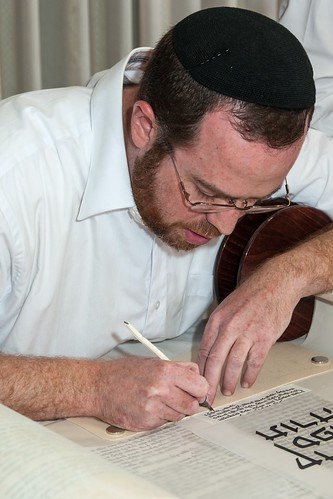The Sofer
|
This series of blog posts can be downloaded as a free ebook.1 For a brief overview of the complete series, including links to all the posts, see Purchasing STAM: Index & Summary. |
The previous post attempted to shed some light on the current sorry state of the STAM industry. This post will attempt to establish criteria for choosing a sofer.
note: The qualities outlined here (and in future chapters) are broad principles and are no guarantee of mehudar (or even kosher) STAM. However, following these guidelines will at least increase the chances that you will know what you are getting and that you will be getting what you paid for.
A sofer STAM (scribe) must be a Torah-observant adult Jewish male.2 He must have a thorough knowledge of the laws of STAM, as well as the necessary technical skills. The first question to ask when researching a sofer is whether he is certified and by whom. Certification alone does not guarantee anything, but it sets a baseline. A sofer who passed a certification exam has, at the very least, demonstrated before an experienced examiner that he possesses a rudimentary knowledge of the laws of STAM. The two largest organizations that certify sofrim today are the Va’ad Mishmeres STAM (sometimes called Machon Mishmeres STAM), and the BADATZ Eida Chareidis. There are many smaller institutions and batei din that issue STAM certification, but the ubiquity of the two larger organizations means that a certificate issued by anyone else is worth some follow-up. That is not to say that there is necessarily a problem, but it would be worthwhile to check with someone knowledgeable about the STAM business to make sure there is no cause for concern.
After initial certification, a sofer must constantly review the relevant halachos – similar to a professional musician or athlete who must constantly practice and train to remain in top form. Along with ongoing review of the halachic texts, a sofer should ideally have access to a qualified posek for questions that come up in the course of writing. At the very least, the sofer should have a relationship with an expert magi’ah (proofreader) who can deal with common issues himself, and has access to poskim who can resolve more obscure matters.
Another equally important quality that a sofer must have is “yiras shamayim” – literally “fear of Heaven”, including honesty and integrity and thus reliability and trustworthiness. Unfortunately, it is very difficult, if not impossible, to evaluate another person’s yiras shamayim. One approach is to seek recommendations from a trusted and knowledgeable third-party. Another is to observe how the sofer acts in other areas of his life, if you know him personally. The further you get from the source the more difficult it will be to get a clear picture of what kind of person the sofer is. Because of this, it is always preferable to buy directly from a sofer you know, or from a trustworthy dealer who knows the sofer personally.
The above advice gives some insight into the sofer himself, but the sofer is only one of the many people involved in the production of STAM. The next installment in this series will discuss more about the magi’ah, as well as the proofreading process in general.
-= 8 =-
-
The blog posts have been revised to reflect edits and corrections made when preparing the ebook edition. ↩
-
For a brief review of who can become a sofer see STAM 101: The Sofer. ↩

